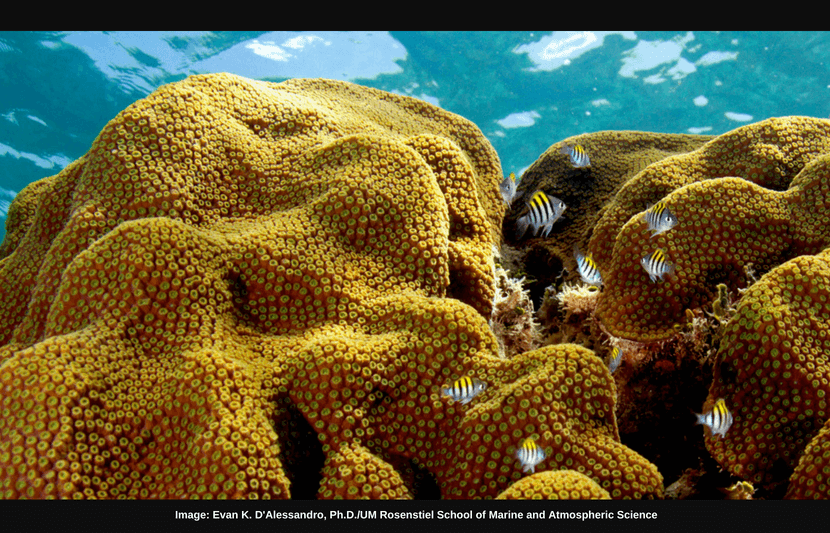Rising ocean temperatures have put many coral species at risk of bleaching or death, but a new study shows that not all corals respond the same way to climate change.
Researchers at the University of Miami studied two different types of corals found in Florida and the Caribbean and found that one of them — mountainous star coral — possesses an adaptation that can withstand higher temperatures and acidic conditions.
“The message that all corals will be dead in 100 years is not right. We are finding that some species already have adaptations that will allow them to survive at least the milder version of warming projections for the end of the century, i.e., a 2 degree Centigrade [3.6 degree Fahrenheit] warming,” said Chris Langdon, a marine biology and ecology professor at the University of Miami’s Rosenstiel School of Marine and Atmospheric Science.
“The evidence that at least some species will survive gives us hope and motivation to find out what makes these corals special and a direction to future research directed at seeing if there is a way to instill this adaptation into to other species.”
The study is published in the journal ASLO.
The experiments
The researchers began the study by exposing two threatened coral species, staghorn coral (Acropora cervicornis) and mountainous star coral (Orbicella faveolata) to combinations of normal and elevated temperature and increased carbon dioxide levels for nine weeks.
Normal temperature is defined as 26 degrees Celsius (78.8 degree Fahrenheit), elevated temperature as 32 degrees Celsius (89.6 degree Fahrenheit), and increased carbon dioxide as pH 7.8/800 ppm.
Then, at the end of the nine weeks, any surviving corals were recovered at a cool temperature and normal pH level to determine the ability of these corals to bounce back once environmental conditions change, as this naturally occurs when summer transitions into fall.
During the nine weeks, genetic and physiological data on the corals, such as skeletal growth, were collected to determine if stress events are recorded in the corals’ skeletal history.
The findings
When the nine weeks ended, the researchers found that staghorn coral was much more sensitive to heat stress. After 25 days of an elevated temperature of 1.5 degrees Celsius (2.7 degrees Fahrenheit) above the historical maximum monthly mean temperature for the Florida Keys, the coral experienced 100 percent mortality.
The finding comes at a time when South Florida waters are predicted to experience hot spells of this intensity and duration once every five years by 2035, which could cause the species to become increasingly rare in the next 20 years.
However, on a more positive note, the mountainous star coral survived 62 days at the elevated temperature and quickly recovered when temperature was reduced at the end of the experiment.
Additionally, while reduced pH significantly impact growth under normal temperatures, it did not affect its survival.
“Based on these results we predict that mountainous star coral will very conservatively be able to tolerate any warming the Florida Keys is likely to experience now until 2060 and very possibly to the end of the century,” Langdon said in a statement.
“This optimistic prediction needs to be qualified by the fact that decreasing pH will impact the reproductive potential of this species. While the decreasing pH won’t kill the corals outright it will mean that fewer baby corals will be produced to replace adult corals that die of natural or unnatural causes.”
Key to mountainous star coral’s survival
Coral reefs are particularly vulnerable to climate change due to their sensitivity to heat.
This is because, when coral reefs form, they develop a symbiotic relationship with algae that helps them grow. But, when water near a reef gets overheated, the coral algae begins producing toxins and the corals expel them from their tissue in self-defense. Known as coral bleaching, this process turns the corals a ghostly white, leaving them stressed and vulnerable to starvation or disease.
The researchers believe the mountainous star coral didn’t feel these effects because it has a special type of algae, called D symbionts, which allows it to better adapt to climate change.
“[D symbionts] have proteins that are less prone to heat damage or they may have more efficient damage repair mechanisms,” said Langdon.
Continuing the study
Langdon and his team plan on carrying out further studies to better understand coral tolerance to stress.
“Future research will be directed at identifying coral genotypes that are tolerant to heat and low pH stress and then identify what adaptations make them tolerant,” said Langdon.



